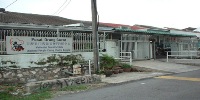2008 Theme
"Convention on the Rights of Persons with Disabilities:
Dignity and justice for all of us"
"Convention on the Rights of Persons with Disabilities:
Dignity and justice for all of us"
Why a Convention?
A response to the fact that although pre-existing human rights conventions offer considerable potential to promote and protect the rights of persons with disabilities, this potential was not being tapped. Persons with disabilities continued being denied their human rights ad were kept on the margins of society in all parts of the world. The Convention sets out the legal obligations on States to promote and protect the rights of persons with disabilities. It does not create new rights.
Purpose of Convention
To promote, protect and ensure the full and equal enjoyment of all human rights and fundamental freedoms by all persons with disabilities, and to promote respect for their inherent dignity.
A Paradigm Shift
Persons with disabilities are not viewed as "objects" of charity, medical treatment and social protection; rather as "subjects" with rights, who are capable of claiming those rights and making decisions for their lives based on their free and informed consent as well as being active members of society.
What is Disability?
Preamble of the Convention states :
Disability is an evolving concept, and that disability results from the interaction between persons with impairments and attitudinal and environmental barriers that hinders full and effective participation in society on an equal basis with others.
Article 1 of the Convention states:
Persons with disabilities include those who have long-term physical, mental, intellectual or sensory impairments which in interaction with various barriers may hinder their full and effective participation in society on an equal basis with others
Disability results from an interaction between a non-inclusive society and invididuals:
Person using a wheelchair might have difficulties gaining employment not because of the wheelchair, but because there are environmental barrier such as inaccessible buses or staircases which impede access.
Person with extreme near-sightedness who does not have access to corrective lenses may not be able to perform daily tasks. This same person with prescription eyeglasses would be able to perform all tasks without problems.
General Principles
- Respect for inherent dignity, individual autonomy including the freedom to make one's own choices, and independence of persons
- Non-discrimination
- Full and effective participation and inclusion in society
- Respect for difference and acceptance of persons with disabilities as part of human diversity and humanity
- Equality of opportunity
- Accessibility
- Equality between men and women
- Respect for the evolving capacities of children with disabilities and respect for the right of children with disabilities to preserve their identities
- Participation is important to correctly identify specific needs, and to empower the individual

Map of Signatures and Ratifications as of 8 June 2008
Source : http://www.un.org/disabilities/






No comments:
Post a Comment